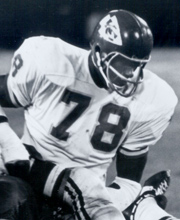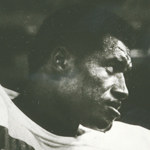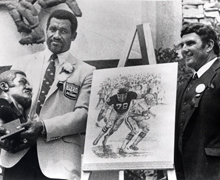LB / LB/DE
Bobby Bell
Class of 1983
All-AFL/AFC selection
9
Interceptions
26
Seasons
12
TDs
9
"I’ve got to be a jump ahead. I like to do things on reaction. I don’t like to wait and think. If you do that, you’re always late.”
Enshrinement Speech
Career Highlights
 Bobby Bell was the most highly honored college lineman of the 1962 season. His coach at the University of Minnesota described the two-time All-America choice and Outland Trophy winner as “the greatest lineman I have ever seen.”
Bobby Bell was the most highly honored college lineman of the 1962 season. His coach at the University of Minnesota described the two-time All-America choice and Outland Trophy winner as “the greatest lineman I have ever seen.”
It’s hard to believe the versatile 6-foot-4, 228-pound Bell actually began his college career as a quarterback. The Kansas City Chiefs of the then-young American Football League were so convinced that Bell would sign with the Minnesota Vikings of the rival National Football League that they didn’t even bother selecting him until the seventh round of the 1963 draft. The University of Minnesota star stunned the pro football world when he opted to sign with the Chiefs. Bell began his 12-year career with Kansas City as a defensive end.
He excelled in coach Hank Stram’s “stack defense,” which called for him to drop out of the 4-3 alignment and become a fourth linebacker. In 1965, after winning all-league honors as a defensive end the previous season, Bell was shifted to outside linebacker. His size and speed made him ideal for the position. As a linebacker, he was named All-AFL or All-NFL every year from 1965 through 1971.
During his career, the versatile Bell intercepted 26 passes, returning six for touchdowns. He also scored on an onside kick return and two fumble recoveries. Built in the shape of an inverted pyramid with massive shoulders tapering down to a 32-inch waist, Bobby presented a fearsome appearance on the field. He had the physique to withstand punishment as well as to deal it out. What made him stand out from the crowd was his superior approach to the game, a willingness to play anywhere even when injured and his great joy at just playing the game. Bell was the first Kansas City Chiefs player to be elected to the Pro Football Hall of Fame.
|
Defensive
|
|||||||||
| Year |
Team
|
G
|
Int
|
Yds
|
Avg
|
TD
|
FumRec.
|
Yds
|
TD
|
| 1963 | Kansas City |
14
|
1
|
20
|
20.4
|
0
|
1
|
0
|
0
|
| 1964 | Kansas City |
14
|
1
|
4
|
4.0
|
0
|
2
|
11
|
1
|
| 1965 | Kansas City |
14
|
4
|
73
|
18.3
|
1
|
2
|
4
|
0
|
| 1966 | Kansas City |
14
|
2
|
14
|
7.0
|
0
|
1
|
7
|
1
|
| 1967 | Kansas City |
14
|
4
|
82
|
20.5
|
1
|
2
|
0
|
0
|
| 1968 | Kansas City |
14
|
5
|
95
|
19.0
|
0
|
2
|
0
|
0
|
| 1969 | Kansas City |
14
|
0
|
0
|
---
|
0
|
3
|
0
|
0
|
| 1970 | Kansas City |
14
|
3
|
57
|
19.0
|
1
|
1
|
0
|
0
|
| 1971 | Kansas City |
14
|
1
|
26
|
26.0
|
1
|
0
|
0
|
0
|
| 1972 | Kansas City |
14
|
3
|
56
|
18.7
|
1
|
1
|
0
|
0
|
| 1973 | Kansas City |
14
|
1
|
24
|
24.0
|
0
|
0
|
0
|
0
|
| 1974 | Kansas City |
14
|
1
|
28
|
28.0
|
1
|
0
|
0
|
0
|
| Career Total |
168
|
26
|
479
|
18.4
|
6
|
15
|
22
|
2
|
|
| Additional Career Statistics: Scoring: 9 TD; Kickoff Returns: 1-53, 1 TD | |||||||||
Championship Games
1966 AFL – Kansas City Chiefs 31, Buffalo Bills 7
Bell started at outside linebacker for the Chiefs. No other statistical data is available.
1969 AFL – Kansas City Chiefs 17, Oakland Raiders 7
Bell started at outside linebacker for the Chiefs. He recorded eight tackles and one assist and one pass defensed.
Super Bowls
Super Bowl I – Green Bay Packers 35, Kansas City Chiefs 10
Bell started at outside linebacker for the Chiefs. He registered seven tackles and one assist.
Super Bowl IV – Kansas City Chiefs 23, Minnesota 7
Bell started at outside linebacker for the Chiefs. He recorded one tackles and two assists.
All-Pro Team: 1969 (HOF, PFWA, NEA)
All-AFL: 1964 (UPI) • 1965 (AP, UPI, OL, NEA, NY) • 1966 (AP, UPI, OL, NEA, NY) • 1967 (AP, UPI, SN, NY) • 1968 (AP, UPI, NEA, NY, SN, PW) • 1969 (AP, UPI, NEA, SN, NY, PW)
All-AFL Second Team: 1964 (AP, OL, NEA, NY) • 1967 (NEA)
All-NFL: 1970 (AP, PFWA, NEA, PW) • 1971 (PW)
All-NFL Second Team: 1971 (PFWA, NEA)
All-AFC: 1970 (AP, UPI, SN, PW) • 1971 (AP, UPI, SN PW) • 1972 (SN)
(9) – 1965, 1966, 1967, 1968, 1969, 1970, 1971, 1972, 1973
• [1st] Most Defensive Touchdowns, Career – 8 (1963-1974)
• [1st] Most Opponents' Fumble Recoveries, Career – 15 (1963-1974)
• [1st] Most Interceptions Return Touchdowns, Career – 6 (1963-1974)
• [2nd] Most Consecutive Games Played, Career – 168 (1963-1974)
• [Tied for 3rd] Most Seasons –12
| Year-by-Year Team Records | |||||
| Year | Team | W | L | T | Division Finish |
| 1963 | Kansas City Chiefs | 5 | 7 | 2 | (3rd) |
| 1964 | Kansas City Chiefs | 7 | 7 | 0 | (2nd) |
| 1965 | Kansas City Chiefs | 7 | 5 | 2 | (1st) |
| 1966 | Kansas City Chiefs | 11 | 2 | 1 | (1st) |
| 1967 | Kansas City Chiefs | 9 | 5 | 0 | (2nd) |
| 1968 | Kansas City Chiefs | 12 | 2 | 0 | (2nd) |
| 1969 | Kansas City Chiefs | 11 | 3 | 0 | (2nd) |
| 1970 | Kansas City Chiefs | 7 | 5 | 2 | (2nd) |
| 1971 | Kansas City Chiefs | 10 | 3 | 1 | (1st) |
| 1972 | Kansas City Chiefs | 8 | 6 | 0 | (2nd) |
| 1973 | Kansas City Chiefs | 7 | 5 | 2 | (2nd) |
| 1974 | Kansas City Chiefs | 5 | 9 | 0 | (3rd) |
 Full Name: Bobby Lee Bell, Jr.
Full Name: Bobby Lee Bell, Jr.
Birthdate: June 17, 1940
Birthplace: Shelby, North Carolina
High School: Cleveland (Shelby, NC)
Elected to Pro Football Hall of Fame: January 29, 1983
Enshrined into Pro Football Hall of Fame: July 30, 1983
Presenter: Hank Stram, Bell's Head Coach with Chiefs
Other Members of Class of 1983: Sid Gillman, Sonny Jurgensen, Bobby Mitchell, Paul Warfield
Pro Career: 12 seasons, 168 games
Drafted: 7th round (56th overall) in 1963 by Dallas Texans, AFL
Uniform Number: 78
Pro Football Hall of Fame
July 30, 1983
Thank you very much. Bobby Bell, No. 78, 6'4'', 225, position - quarterback, halfback, defensive tackle, offensive tackle, offensive center, linebacker, and that is about all he ever did. Bobby Bell is referred to as a football player. But Bobby Bell was not a football player. Bobby Bell was a man who played football. Football is what he did and not what he was. He was blessed with outstanding skill and ability, and I think he was probably the most versatile player I have ever been associated with or anyone has ever been associated with. And without a doubt, the greatest outside linebacker that ever played the game, and I certainly believe that. And to demonstrate that point, Bobby Bell is coming in and being inducted in the Hall of Fame today as the first and only outside linebacker to receive the honor so far, and that speaks for itself and, of course, the great skill of Bobby Bell.
He was the only player in my 30 years of coaching that had the ability to play any position on a football team and that team would still win. He played for three coaches: his coach in Cleveland High School in Shelby, N.C.; Murray Warmath, the great coach of Minnesota; and myself. And we all had the same problem. We had difficulty trying to figure out where to play him. The strategy of his high school coach was to start him out as a quarterback and then he moved him to halfback and he made all-state in both positions. Then he went to Minnesota on a scholarship to be a quarterback. He played quarterback for a year, and I understand he had the ability to throw the ball 80 yards. The only problem was when he threw it 80 yards the receivers were down about 35 or 40. So it didn't take long for Murray to change him from a quarterback to a defensive tackle, offensive tackle and an offensive center. The first position an award for the outstanding lineman when he graduated from the University of Minnesota where the two Rose Bowl games he was All-American.
We brought him in as a defensive end because we felt we needed help drastically at that spot. He played there for a year and did it very well. And then we moved him to linebacker, and at that particular time we deliberated really about the fact that he might play a strong safety, a weak safety or even a cornerback. Then he played linebacker. He stayed there and became an All-Pro and was honored in that particular capacity on eight different occasions. He was really something very special, and we are all very, very proud in the fact that he did so well.
No. 1: He always had the capacity to see clearly and believe strongly. He thought he could do anything and do it better than anybody else.
No. 2: He had a great attitude. He wasn't a stock market player; he wasn't up or down. He was always the same. He was great. He loved to practice; he loved to play. He had a lot of faults, but he knew when to play and when to work and added a great leadership dimension to our football team.
No. 3: He didn't permit himself to be susceptible to the negative influence of other people. He knew what he wanted, and if there was any kind of a problem on the squad, he would try to help it, and he believed in what he did and what we did. And that is why we went on to enjoy the great success and enjoy being one of the winningest teams in the history of professional football during that short span of time. He also had a great capacity to follow through with a resolution once the mood of which that resolution was made had passed. Now a lot of people say I'm going to do this and I'm going to do that, and when the time comes, they get out of the mood of what they said they were going to do. Bobby was not that way. Once he made up his mind, he was going to do that. He did it extremely well.
And last, the point I want to make is that he was a make-it-happen player. He made things happen. He was a big-play guy. And how could any of us in the old American Football League and especially the Kansas City Chiefs forget the big play he made against the New York Jets before our Super Bowl win in 1969. We were winning the game 6 to 3, the New York Jets with Namath himself and Weeb Ewbank, They were on the 1-yard line with the score 6-3 in our favor and 1 yard to go for a touchdown, and our great defense rose to the occasion and stopped them. It was second-and-1 and we did the same thing. Third-and-1 we did the same thing and on fourth-and-1 we called a blitz. Bobby Bell was supposed to blitz from the outside. He got a whiff of the fact that he thought Snell was going to get a pass. He stopped in the middle of the blitz, made Joe Namath deliberate for just a second. While he was doing that, he gave Namath the sack and we went on to win the game 13-6.
This is one of many, many great plays that he made and just is typical of the made-to-happen guy he was. As I mentioned, he was involved in a lot of firsts. The first linebacker to be inducted in this Hall of Fame. He also is involved in another first here today in that he is the first American Football League player to have played on an American Football League Championship to earn the double distinction of being able to wear the Super Bowl ring and a ring as a Hall of Famer. Congratulations, Bobby, and thanks for the distinction and honor of providing me to be your presenter today. I know it is a tremendous day for you, but I want you to know that it is also a great day for the Kansas City Chiefs family,
 all the great people and all the great fans of Kansas City and every person who had anything at all to do with the American Football League. They swell with pride of the joy and honor and great glory that is yours today along with Sid Gillman. Congratulations, God bless and here he is, Bobby Bell.
all the great people and all the great fans of Kansas City and every person who had anything at all to do with the American Football League. They swell with pride of the joy and honor and great glory that is yours today along with Sid Gillman. Congratulations, God bless and here he is, Bobby Bell.Bobby Bell:
Thank you, Coach Stram. Your love, faith and comments are deeply appreciated and just your being here means a great deal to me. Thanks again, Hank.
Distinguished guests, ladies and gentlemen. To be considered to join the elite group of pro football greats is beyond my expectations. Be assured, the honor and the true meaning will ever be treasured by me. And also it is known that you do not honor individually, but those many people who made imprints on Bobby Bell's athletic corner. There are many who left their signature on Bobby Bell and shared the corner. Allow me to comment on just a few.
In my hometown of Shelby, N.C., Willie Casper first introduced me to organized sports competition through the boys club. And it was not football; it was baseball. People helped me a lot, people like Jackie Robinson and Joe Willis. They were examples of people who achieved a lot in sports. True physical achievements to be used by us to set high goals. John Weston, Cleveland High School football coach, in Shelby, convinced his athletes, all 12 of us, that physical fitness and fundamentals and over-achievements could be obtained. We went in sometimes losers but always aware of our developments.
Unlike going from Shelby, N.C. to Minnesota, the transition to Kansas City was achieved with more confidence. This team had a lot of young potential talent with the coaching of Hank Stram. It was a natural for Hank Stram, the style and development of players. It came with unity and room to improve. Each game plan was detailed and complex, and yet the figurations were simple. Then being organized in your effort. And we were neat, organized and enjoyed winning games. My association with Hank was a great experience. Excellence on and off the field was expected and nothing less and we did it, too, as an individual and as a team.
Shelby is still my home. It is a great place to live and conduct a business. The people are friendly, and some of my folks are here with me today and I would like to thank them for coming. Now may I introduce some people I owe so much: my family, would you please stand while I call your name and remain standing? From Kansas City, my daughter, Tracy; my grandson, Freddie; my son, Bobby; and my friend Gale Kaughman; my sister from Shelby, Mrs. Mattie Roberts; my mother and father. Thanks for being with me.

